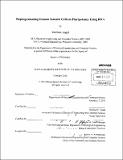| dc.contributor.advisor | Mehmet F. Yanik. | en_US |
| dc.contributor.author | Angel, Matthew (Matthew M.) | en_US |
| dc.contributor.other | Massachusetts Institute of Technology. Dept. of Electrical Engineering and Computer Science. | en_US |
| dc.date.accessioned | 2012-05-15T21:12:23Z | |
| dc.date.available | 2012-05-15T21:12:23Z | |
| dc.date.copyright | 2012 | en_US |
| dc.date.issued | 2012 | en_US |
| dc.identifier.uri | http://hdl.handle.net/1721.1/70786 | |
| dc.description | Thesis (Ph. D.)--Massachusetts Institute of Technology, Dept. of Electrical Engineering and Computer Science, 2012. | en_US |
| dc.description | Cataloged from PDF version of thesis. | en_US |
| dc.description | Includes bibliographical references (p. 83-89). | en_US |
| dc.description.abstract | Somatic cells can be reprogrammed to a pluripotent stem-cell state by ectopic expression of defined proteins. However, existing reprogramming methods take several weeks, suffer from low efficiencies, and most use DNA-based vectors, which carry mutagenesis risks. Here, we describe efficient and rapid reprogramming of human cells using RNA. Within two weeks, fibroblasts from 7 adult patients, including 5 Parkinson's patients aged 53 to 85, formed colonies that exhibited gene expression consistent with pluripotent stem cells. Established lines generated teratomas in vivo, and differentiated into tyrosine hydroxylase-positive neurons in vitro. Genetic analysis using array comparative genomic hybridization with an 8.9kb median probe spacing demonstrated that RNA reprogramming can yield lines free of copy number variations. The very high efficiency of this technique allowed us to reprogram single adult fibroblasts to pluripotency with a 44% success rate (n = 9). Our results suggest that the efficiency and kinetics of reprogramming methods need not be limited by a fundamental stochastic element as has been suggested. Due to the high efficiency, speed, reliability, and integration-free nature of RNA reprogramming, this technique will likely become the method of choice for generating disease and patient-specific pluripotent stem cells. | en_US |
| dc.description.statementofresponsibility | by Matthew Angel. | en_US |
| dc.format.extent | 89 p. | en_US |
| dc.language.iso | eng | en_US |
| dc.publisher | Massachusetts Institute of Technology | en_US |
| dc.rights | M.I.T. theses are protected by
copyright. They may be viewed from this source for any purpose, but
reproduction or distribution in any format is prohibited without written
permission. See provided URL for inquiries about permission. | en_US |
| dc.rights.uri | http://dspace.mit.edu/handle/1721.1/7582 | en_US |
| dc.subject | Electrical Engineering and Computer Science. | en_US |
| dc.title | Reprogramming human somatic cells to pluripotency using RNA | en_US |
| dc.type | Thesis | en_US |
| dc.description.degree | Ph.D. | en_US |
| dc.contributor.department | Massachusetts Institute of Technology. Department of Electrical Engineering and Computer Science | |
| dc.identifier.oclc | 792742733 | en_US |
